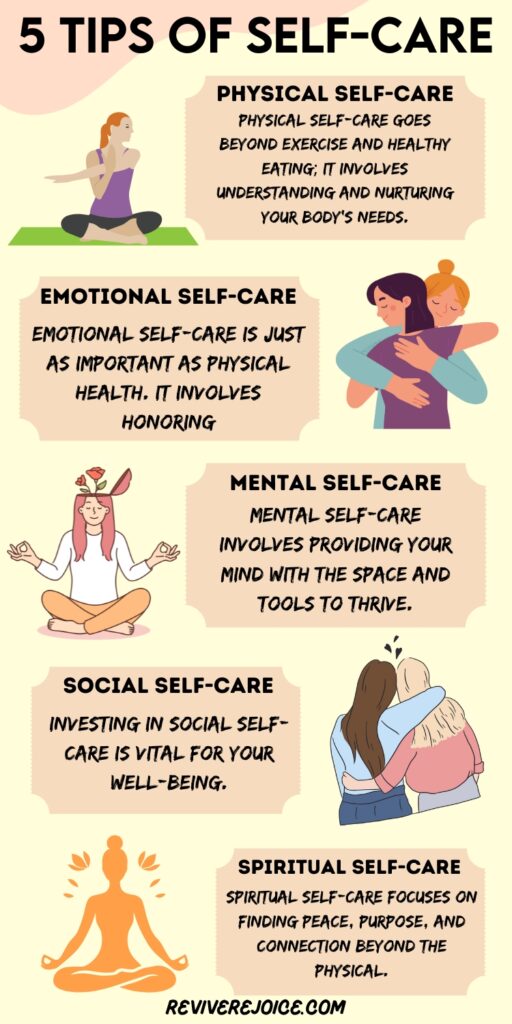5 Main Types of Self Care for a Balanced Life (+ Examples)
If you’re feeling overwhelmed while trying to balance multiple responsibilities, you’re not alone.
The key to maintaining that balance lies in practicing self-care. Without it, burnout can sneak up on us, leaving us feeling drained and disheartened.
In this post, we’ll explore five essential types of self-care that will help you restore balance, giving you more energy, mental clarity, and emotional strength.
Learn how these simple practices can lead to a healthier, more fulfilling life where you finally put yourself first.
Save this Post for Later! ⬇️

#Types of Self Care
. Physical Self-Care
. Emotional Self-Care
. Mental Self-Care
. Social Self-Care
. Spiritual Self-Care
1. Physical Self-Care

The Foundation of Physical Self-Care
Your body is your home and deserves the same care we give to other areas of our lives.
Physical self-care goes beyond exercise and healthy eating; it involves understanding and nurturing your body’s needs.
When you prioritize your physical well-being, everything else in life tends to fall into place more easily.
Movement, Rest, and Nourishment
. Movement keeps your body active and your mind clear.
. Rest sleep is one of the most overlooked forms of physical self-care.
. Nourishment of your body has a direct impact on your mood, energy, and overall health.
2. Emotional Self-Care

Nurturing Your Emotional Well-Being
Emotional self-care is just as important as physical health. It involves honoring and fully experiencing your feelings without judgment.
Life’s challenges can affect your mental well-being, so managing emotions compassionately is crucial.
The goal is not to avoid negative feelings but to address them healthily.
Boundaries and Self-Compassion
A crucial aspect of emotional self-care is setting healthy boundaries. Constantly giving to others without considering your limits can lead to burnout.
Setting boundaries shows self-love, even if it disappoints others. It’s not selfish; it’s about protecting your mental and emotional well-being.
3. Mental Self-Care

Cultivating a Strong Mind
Mental self-care involves providing your mind with the space and tools to thrive.
In life’s chaos, it helps you process thoughts and feelings. It’s not just about positive thinking; it’s about building resilience, managing stress, and staying present.
The Power of Boundaries and Breaks
An important aspect of mental self-care is setting boundaries. Saying no is okay; your time and energy are valuable.
Clear boundaries can reduce burnout and boost productivity. Instead of cutting people off, boundaries create a balance that helps you thrive mentally.
4. Social Self-Care

Nurturing Connections for Social Self-Care
Investing in social self-care is vital for your well-being. It’s not about having the most friends but nurturing meaningful connections that uplift you.
Whether it’s a weekly call with a best friend, quality time with family, or a coffee date with a coworker, these moments nourish your spirit.
The Power of Saying No and Creating Space
We often feel pressured to say “yes” in social situations, but knowing when to say no is crucial for self-care.
Protecting your time and energy helps you invest fully in the relationships that matter most.
5. Spiritual Self-Care

Connecting with Your Inner Self
Spiritual self-care focuses on finding peace, purpose, and connection beyond the physical. It isn’t just for the religious; it’s for anyone seeking meaning.
Through practices like meditation, prayer, or spending time in nature, you can connect with your deeper self and realign with your values during stressful times.
Purpose and Peace Through Rituals
Rituals play a vital role in spiritual self-care by providing comfort and grounding during overwhelming times.
They don’t need to be elaborate simple acts like lighting a candle, repeating positive affirmations, or practicing mindfulness during your morning coffee can bring a sense of purpose and peace.








